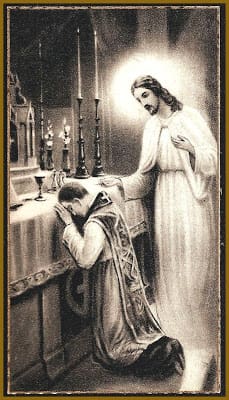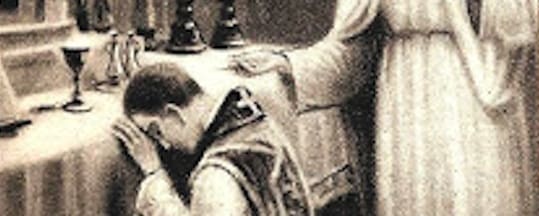Dear Father John, I hate to admit this, but I still get distracted at Mass. I mean, I love Mass! I go almost every day! I believe in it, I look  forward to it… But I still get distracted during Mass. I really wish I didn’t – I want to worship God perfectly, like we’re supposed to. Can you help me?
forward to it… But I still get distracted during Mass. I really wish I didn’t – I want to worship God perfectly, like we’re supposed to. Can you help me?
In our first post on this topic, we discussed distractions during Mass. Fr. John gave reflections on the mystery of the sacrifice of the Mass and how we need to find ourselves living the Mass with spontaneous reverence and even amazement.
Making Connections
But if this perfect sacrifice was only offered “once,” how could it also be offered “for all”? That’s what the Letter to the Hebrews says; it says that Jesus “did that once for all.” Yet, how could he do it for us, if we weren’t there on that first Good Friday? We hadn’t even been born yet. So how does that sacrifice make up for our sins? How does that perfect offering become part of our worship of God? This is the key question. And the answer is found in our second word: memorial.
You see, the amazing thing about this high priest and this victim is that, because he was sinless and offered himself in the place of sinners, his story didn’t end with his death. He rose from the dead – proving that goodness is more powerful than evil, that God’s mercy is more powerful than human sin.
Earlier, the Letter to the Hebrews explains that our High Priest is not gone, not merely a chapter in ancient history. No. Rather, “Jesus, because he remains forever, has a priesthood that does not pass away. Therefore, he is always able to save those who approach God through him, since he lives forever to make intercession for them” (Hebrews 7:24-25). Jesus is still offering himself to the Father, giving him perfect worship and atoning for our sins, right now.
Plugging In
For us to receive God’s saving grace, the grace we need to become children of God, and the grace we continue to need so that we can grow up to spiritual maturity as children of God, we just have to plug in (so to speak) to Jesus’ sacrifice on the Cross. And that is exactly what we do at Mass.
Every Celebration of the Eucharist at Mass re-presents, makes present (cf. Catechism #1366) in the here and now of our lives, the one eternal sacrifice of Jesus on the cross. This is what the Church means when it calls the Mass a “memorial.” It is not only a remembering of past events, but a sacramental making-present of this one, central event in the history of the universe.
Jesus knew that we would need that – we would need a way to plug in to his perfect sacrifice, to participate in it, to benefit from it, to link our imperfect and sinful lives to it, so that we could offer perfect worship to God and make atonement for our own sins and the sins of those around us. And so, at the Last Supper, he gave us a way to do that.
He instituted a sacrament that He himself would use to continue exercising his priesthood in our favor, to make present his self-offering at Calvary in every corner of time and space. He took bread and wine, he consecrated them into his own body and blood – the elements of his sacrifice on the Cross – and he empowered and commanded his Apostles to “do this in memory of me.” And ever since that night, the Church has been obeying that command.
Crossing the Bridge between Time and Eternity
And every time the Mass is celebrated, whether on a battlefield in war, in a prison yard, or on a marble altar in a magnificent Cathedral, the curtain of time and space is drawn aside, and we, God’s children, join our own imperfect prayers and sacrifices to the perfect prayer and sacrifice of Jesus on the cross. And when we receive Holy Communion, we immerse our own fallen, sinful, human nature in the perfection of Christ’s divine and resurrected humanity.
The Masses said every day in churches throughout the world, then, are not many sacrifices; they are not new sacrifices being offered day after day. They are one single sacrifice, the perfect sacrifice offered once for all by Jesus on the cross, made present in the here and now of our lives, through the sacramental Celebration of the Eucharist – the High Priest continuing his redeeming work through his ordained ministers.
God’s Reasons and Our Response
Why did God decide to do it like this?
Just because he loved us. After the mess we created with original sin, he wanted to redeem our human nature, not remake it entirely. And so he found a way to bring the infinite glory of eternity into the constant and changing flow of time and space. That’s what the Eucharist is. That’s what the Mass is – every Mass.
If we let this truth sink in, if we cultivate it, especially through meditation on these marvelous and astounding truths, a humble awareness of the magnificence of the Mass, you can see how distractions will have less of a hold on our hearts. The words of the liturgy, and the gestures, will take on a new meaning for us. And when we receive our Lord in Holy Communion, we will consciously unite our little, imperfect sacrifices to his infinite, perfect sacrifice, making ourselves into little bridges leading the world around us closer to the big bridge that links heaven and earth, the bridge of Christ himself.
I would like to finish with a quotation from Blessed John Paul II, who lived the Mass so well during his years on earth, and who can be a powerful patron saint for our efforts to live the Mass more deeply. May he help us do so every single time we participate in the Mass, for however many more years we have on this earth:
I have been able to celebrate Holy Mass in chapels built along mountain paths, on lakeshores and seacoasts; I have celebrated it on altars built in stadiums and in city squares… This varied scenario of celebrations of the Eucharist has given me a powerful experience of its universal and, so to speak, cosmic character. Yes, cosmic! Because even when it is celebrated on the humble altar of a country church, the Eucharist is always in some way celebrated on the altar of the world. It unites heaven and earth. It embraces and permeates all creation (Encyclical Letter Ecclesia de Eucaristia, #8, April 17, 2003).


